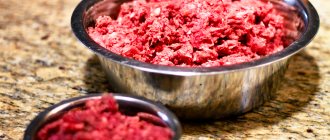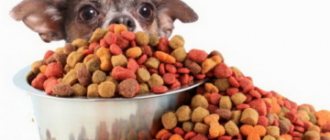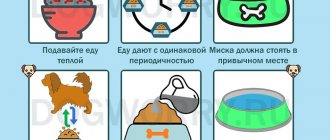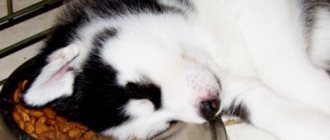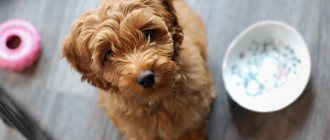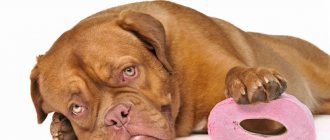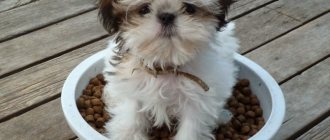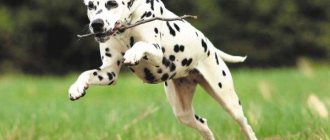05/15/2019 Drozd Nikolaevich Animals 9
Not many breeders know whether kefir can be given to a dog and in what doses. Meanwhile, these fermented milk products are very useful for the pet’s delicate body. Of course, as with any food, there are a number of situations when kefir not only will not be beneficial, but can cause some harm to the dog. However, first things first.
What is kefir
A fermented milk drink with a very pleasant taste is called kefir. As a result of the addition of special kefir microorganisms - fungi, whole milk is fermented. This makes a very healthy drink.
Kefir consists of calcium, magnesium, potassium, vitamin A, Omega-3 and Omega-6 fatty acids. All these elements make the drink vital for both children and adults. It is also very useful for pets – dogs and cats.
Pregnant, lactating and puppies
It is not recommended to give milk to pregnant representatives of this breed , but in the first week after birth, to enhance lactation, it is recommended to give milk with black tea and honey. However, after 3 weeks, this drink should be removed from the animal’s diet.
In the first 2-3 weeks, puppies have enough mother's milk, since there are no more than 3-4 puppies in the litter. If there is a need for complementary feeding, then you can prepare a mixture of goat's or cow's milk with egg yolk . For 100 ml of milk - one yolk. It is better to feed with a pipette.
Especially for dogs
Now you can buy special milk at a veterinary store .
The most popular brands:
- Beaphar offers milk that is close in composition and taste to natural bitch milk. It is made from easily digestible whey and is used as puppy food.
- ROYAL CANIN created a drink that is similar in properties to bitch milk, with a high protein content.
- BritCare is a specially developed milk for puppies that is in no way inferior in taste and composition to mother's milk.
The benefits of fermented milk products
Can a dog have kefir, cottage cheese and other fermented milk products? The answer is obvious. Many veterinarians are inclined to believe that such food has a positive effect on the animal’s body:
- First of all, fermented milk is a high-quality source of protein and calcium, which are necessary for the full functioning of the cardiovascular, skeletal and nervous systems.
- Such products are absorbed by the body much better than milk. In addition, whole milk is not recommended for adult dogs.
- Food of fermented milk origin contains lacto- and bifidobacteria, which have a beneficial effect on the functioning of the animal’s gastrointestinal tract.
- Kefir, yogurt and fermented baked milk normalize intestinal motor function, which prevents the formation of gases.
- Due to the presence of vitamins B, E, D, A, calcium salts, magnesium, phosphorus, as well as essential amino acids in fermented milk products, metabolism in the body improves.
How to help a pet if he feels bad?
If your pet does drink milk, and after a while he becomes ill, vomiting and diarrhea are observed, this indicates lactose intolerance and food poisoning. You need to help the dog and seek help from a veterinarian , who will prescribe medications for self-treatment at home.
In addition, at home you should :
- Limit your pet's food for a couple of days. If your dog asks to eat, give him some boiled rice.
- Provide constant access to water.
- On the second day, you can give fermented milk products (low-fat cottage cheese) to normalize digestion.
What are the benefits of kefir?
This product is as beneficial for a four-legged pet as it is for humans. This should be kept in mind when wondering whether kefir can be given to a dog. From such food, your pet’s digestion improves, immunity increases, and metabolism harmonizes.
Kefir is extremely beneficial for dogs suffering from obesity. Only the product with the lowest fat content should be included in the diet.
Kefir can also be given to pets who do not eat ready-made food well. The sour taste stimulates the appetite, and after taking 2-3 spoons of the product, the dog is more willing to eat the main food.
Feed your Chihuahua ready-made dry food
In order for the dog to grow up quickly and develop well, they buy super premium food, which is the most natural, or premium food, where the meat is less concentrated.
The disadvantage of dry food is its high cost, but the pet’s health is not a reason to save money. In addition, due to its compact size, the Chihuahua eats little, so 1 package lasts a long time.
Ready-made food has the following advantages:
- no time or effort is spent on creating menus and preparing food, which is practical for busy owners
- Ready-made food already contains the required amount of nutrients, so you don’t have to buy vitamin and mineral supplements
- dry food is easy to store and transport when traveling
Premium and super premium complementary foods are produced by the following brands: Royal Canin, Brit, Acana, Hills, Go Natural, Purina, Monge, Orijen, Bosch, Duke's Farm. When purchasing a certain package, you need to read the recommendations for use that are indicated on it.
You should not give your pets economy class food, such as: Pedigree, Chappi, Darling. Due to the affordable price, the composition does not include meat as such, but only a small amount of offal and an assortment of harmful additives. At best, the food will not bring any benefit.
You should choose what to feed your Chihuahua according to its age: for puppies or adult dogs.
In case of intolerance to any ingredients, it is better to consult a veterinarian before purchasing, who will recommend a suitable hypoallergenic series.
- When changing food, the dog needs supervision for 1 week. If a new diet does not cause negative changes in behavior, it is worth stopping with it.
Can the product cause harm?
The benefits of kefir for dogs and puppies are undeniable. However, the use of such fermented milk must be approached with caution. Excessive use of kefir can cause gastrointestinal upset in your pet. It must be remembered that fresh product can cause loose stools, and standing in the refrigerator for several days contributes to constipation. This should be taken into account, first of all, by owners of older dogs who, due to their advanced age, have digestive problems.
The product can also cause an allergic reaction, which is expressed in excessive tearing, skin irritation, sneezing or even coughing. In this case, you should stop serving kefir and replace it with low-fat cottage cheese.
Which one to choose?
All types of milk of animal and plant origin differ in composition from dog milk. But for bait, it is recommended to choose goat bait , since it has a lower lactose content.
Attention! Chihuahuas do not need to be given fresh milk; it is better to let it sit for a while. For good absorption, cream and egg yolk are added to it.
Cow's milk is not as fatty, but it is less easily digested by the dog's body. Mare's - 90% consists of water, it is low-fat, but it has a high lactose content, so it should absolutely not be given to representatives of this breed.
Another prohibited type of milk is soy ; a Chihuahua may be allergic to it. Safe types of milk for representatives of this breed are almond and coconut , the latter is very sweet, so it should be given in minimal doses.
Which milk should I buy, store-bought or homemade? Of course, it is better to give preference to a homemade product , but if this is not possible, choose a store-bought low-fat product. There are no restrictions on price; give preference to the brand you buy for yourself.
The right portion of sour milk
Is it possible for a dog to have kefir, and most importantly, in what quantities should it be given? It all depends on the size and age of the pet. Small dogs (lapdogs, Yorkshire terriers, Spitz and others) need 1 teaspoon of the product. It is recommended to treat large dogs with 5-6 tablespoons of fermented milk.
How often can you give kefir to dogs? For kids no more than twice a week, for giants - two to three times. Older dogs can be given kefir in their diet every day, since aging pets are prone to constipation. It must be remembered that the product must be fresh.
Approximate dog menu per day
First, let's determine the amount of food for the dog. The daily norm per kilogram of Chihuahua weight is 50 – 80 grams. An adult weighs about two kilograms, therefore, its diet should not exceed 100 - 160 grams per day.
Due to the individual characteristics of the body, it is better to feed the Chihuahua three times a day:
- Breakfast. It's better to start the day with fermented milk products. It is best to give cottage cheese with finely chopped parsley. You can get by with an omelet or a boiled egg.
- Dinner. The main meal occurs in the middle of the day. That’s why they give you meat and boiled porridge. You can treat your pet with fresh grated vegetables or fruits. You need to add a teaspoon of vegetable oil to your food.
- Dinner. Dinner time should not be too late - the dog should have time to use up at least part of the calories eaten. You can give your pet stewed vegetables with added meat.
Is kefir okay for puppies?
The nutrition of a small puppy in the first days of life consists of mother's milk. After some time, when the baby grows a little, fresh cottage cheese and kefir are usually used as the first complementary foods. Many dogs lose the enzymes that break down lactose as they get older. As a result, regular milk is poorly digestible by animals. Therefore, it is advisable to treat young dogs with kefir.
Is it possible to feed a dog this product at a young age? The answer is obvious. Once the pet reaches three to four months of age, the product becomes a complete part of the diet of young animals, along with meat. It can be given in a 50/50% ratio with meat. It is at this age that kefir has the most beneficial effect on the young growing body of a dog. When feeding a puppy with this product, you should take into account that the protein and calcium contained in it are best absorbed in the morning, while meat and vegetables are absorbed in the afternoon.
Kefir is necessary for a dog during puppyhood, when the bone foundation of the animal is laid. In addition, the product has a beneficial effect on the condition of teeth, fur and sense organs - vision and hearing.
When introducing kefir to your pet’s menu, you should take a low-fat product – no more than 1-2%. However, even zero fat content can harm the animal. As you get older, the fat content of kefir can be increased, while monitoring the general condition and reaction of your pet’s body.
Can a Chihuahua have milk: for an adult, a puppy?
Natural milk is an indispensable product when weaning a puppy from its mother; it promotes the normal growth and development of babies.
For older dogs, the drink acts as a laxative, and in some cases causes food allergies, accompanied by itching, skin rashes, swelling, and discharge from the nose, ears and eyes. The body of a mature animal does not produce the enzyme that facilitates the absorption of lactose, milk is excluded from the diet or replaced with a lactose-free drink for dogs, sold in zoological stores.
Cottage cheese, yogurt, fermented baked milk and other fermented milk products
Having figured out whether a dog can have kefir, the question arises regarding other fermented milk products. Which of them are recommended to be included in your pet’s diet and in what quantity? The answer will please, first of all, owners who prefer to keep their pupil on natural food. Dogs can be given absolutely all fermented milk products that do not contain sugar. Ryazhenka, yogurt, drinks “Bifidok”, “Acidophilin”, homemade or purchased yogurt without sugar and additives, whey - everything can be included in the menu of a four-legged pet.
However, you should remember some nuances. For example, fermented baked milk can cause fermentation and flatulence. Therefore, you should not get carried away with it. Store-bought yogurt containing sugar is also extremely undesirable, since, in addition to the sweetener, it also contains preservatives and other additives that may not be tolerated by the dog’s body.
You should also be careful when feeding your pet cheese, milk and sour cream. This is especially true for animals that suffer from a weak pancreas. Such fatty foods can cause diseases such as pancreatitis. This primarily applies to small dogs, whose weak pancreas is a common occurrence.
How to make a proper diet
Naturally fed dogs are given more foods containing calcium: apples, cottage cheese and cauliflower. Just before childbirth, the level of protein in the diet is reduced, and meat and fish are excluded 7-8 days before birth.
After giving birth, dogs are also not given meat for the first days. They feed him cottage cheese, give him calcium supplements and fermented milk products. From the second week they feed him stewed meat with vegetables, give him porridge, and boiled egg yolk. If the bitch is not allergic to milk, you can give her goat's milk.
- A small dose of food is enough for the dog’s body to receive all the necessary vitamins and microelements.
If your pet has noticed problems with the digestive tract, then it is necessary to choose premium medicinal food.
Many breeders note that after introducing dry food into the diet, their pet feels much better. Negative problems from the stomach and digestive system disappear, the dog becomes more active and cheerful.
Careful care and tender care from the owner will allow the Chihuahua to delight him for many years of life together.
Not all expectant mothers eat for two, and if the pet is not obese, she is provided with free access to food. It is unlikely, but possible, that the bitch will develop a tendency to gluttony (often observed during unscheduled matings), in which case the feeding schedule does not change until 2 months of pregnancy.
With a natural diet, the main role is played not by the quantity of food eaten, but by the quality of the food. A dog may seem hungry all the time due to a lack of protein, vitamins or other nutrients. The main mass share of food should be meat products, milk and fish. The amount of grains and high-calorie foods should not be increased.
From the 4th week of pregnancy, the daily food intake increases due to protein products and supplements containing vitamins A, B1, D, E. Fish oil and folic acid must be introduced into the diet; nutritional yeast and bone meal will be useful. In case of multiple pregnancy, calcium supplements are required!
After 5 weeks, the bitch should be switched to 3 or 4 meals a day. The amount of food increases, but the size of the dog's stomach remains the same. Some bitches, due to the growth of the uterus, cannot eat the entire portion, but this does not mean that they do not need additional food. An already rounded mother needs to eat not only soft food. Try to offer your pet raw carrots or apples more often. Exclusively soft foods will provoke the appearance of tartar.
After 6 weeks, the dog’s entire body begins to experience severe overload, especially the kidneys and heart. The expectant mother vitally needs vitamins and nutrients. Some substances deserve a special place in the diet of a pregnant Chihuahua:
- All foods and supplements containing vitamin C are not synthesized or accumulated in dogs' bodies. The first way deficiency manifests itself is anemia.
- Calcium, potassium, phosphorus - the optimal ratio (including protein) is found in whole milk.
- Proteins - found in raw (yolk only) or boiled eggs, lean meat and fish. Eggs are given in doses, since too much protein leads to biotin deficiency. The fish must be boiled (steamed) until the bones are completely disintegrated or thoroughly cleaned before cooking.
- Carbohydrates – wheat and barley cereals are richer than rice or buckwheat.
We suggest you read: What vaccinations does your Chihuahua need?
What bones can you give to a dog and vice versa?
Now let's take a closer look at the features of the bones of different animals, raw or boiled, to understand what benefit or harm their use will have for the dog:
- Beef bones – this is the only similar product that doctors are loyal to. In addition to their low percentage of fat, raw beef bones are quite hard and a dog will not be able to chew them. So large uncut knuckles or beef tail can be a good treat for the puppy during teething. But boiled beef bones should not be given. They are softer and the dog will easily clog his stomach with them.
- Pork bones are a product that is similar to beef bones, but only in their whole form, provided that all the fat has been cut off from them. Boiled pork bones should not be given - they burst when bitten and have sharp corners that can perforate the gastrointestinal tract.
- Lamb bones are an undesirable product on the menu. They have a high fat content and are not perceived by the animal’s body. It is better to abandon them in favor of beef.
- Turkey bones officially recognized as unfit for consumption by dogs. The exception is the necks, which contain soft round bones that are not harmful to health. Turkey bones, or more precisely necks, can be consumed both raw and boiled. But paws, beloved by many animal owners, cannot be given. They often contain salmonella, which is dangerous to your dog's health.
- Rabbit bones are tubular, identical to bird bones. If they enter the esophagus, they easily injure it and can pierce the stomach or intestines of the animal. Therefore, this product is prohibited for dogs.
- Chicken bones - one of the most dangerous for dogs. They are hollow and, when chewed, form numerous sharp long twigs. They cause perforation of any part of the animal’s gastrointestinal tract and feeding such products can even lead to the death of the pet. Chicken bones should be disposed of securely so that your dog cannot find them. Chicken feet are also not needed by a dog - they have sharp claws, and eating them raw puts the dog at risk of contracting dangerous salmonellosis.
- Fish bones most dangerous for the animal. Their very appearance suggests that such bones, and even whole fish, cannot be given to a dog, either raw or boiled. If you start giving fish bones to dogs, this will immediately lead the animal to the veterinarian’s operating table, since they injure the larynx, getting stuck there, and even cause asphyxia.
- Boiled bones are of no use to any animal, be it a dachshund or a St. Bernard. During cooking, the bone becomes softer and easier to bite and then swallow. And since for some reason the dog loves bones more than anything in the world, it can harm its own health from greed. It is strictly unacceptable to cook porridge with bones for a dog, but bone broth will be suitable and even beneficial for the animal.
- Raw bones can be given whole when the risk of being bitten is minimized. This toy is useful for the puppy, but after changing teeth it is better to gradually stop giving the treat to the baby due to its minimal nutritional value.
